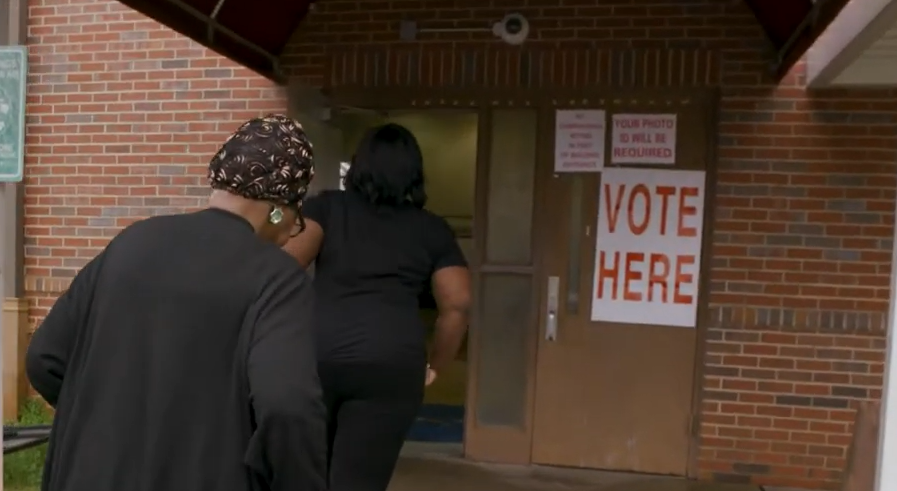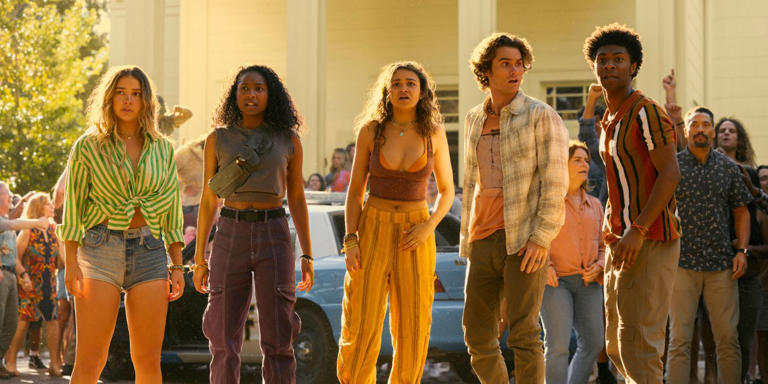Disenfranchisement laws were a reactionary response to the 13th, 14th and 15th amendments to the Constitution which ended slavery and granted equal citizenship to the formerly enslaved, and prohibited racial discrimination in voting. Some states then modified their laws to keep the polls White by creating literacy tests, residency requirements and more.
[National Update]
A Continuation of the Civil Rights Struggle
Nearly four million men and women across the U.S. with a past criminal conviction, now living and working in their communities, have been legally stripped of their right to vote.
The Brennan Center for Justice at New York University School of Law believes it is morally wrong and socially self-defeating to exclude citizens from full participation in our democracy. The center is working hard to make right this wrong through The Democracy Restoration Act, a bill now before Congress.
In New York City alone, 122,018 men and women are disenfranchised−54% in prison or jail and 46% on parole. Of that total, 78,692 are African American and approximately 63,000 are African-American males. These men and women contribute to society and pay taxes, but cannot vote.
The Democracy Restoration Act was based on a report, “Restoring the Right to Vote,” authored by Erika Wood, attorney and deputy director of the Democracy Program at The Brennan Center. In a recent press release, Wood said “Excluding millions of citizens from the franchise only weakens our democracy. Congress should pass the Democracy Restoration Act because a strong, vibrant democracy requires the broadest possible base of voter participation, across all sectors of society.”
The bill was introduced by Congressman John Conyers, founding member of the Congressional Black Caucus, and Senator Russ Feingold on July 24th, 2009; HR 3335 and S. 1516, respectively. It’s currently in its first stage of legislation, in committee.
Rep. Conyers said, “three grave discrepancies in State laws regarding felony convictions that lead to unfairness in Federal elections” in a statement, noting: “First, there is no uniform standard for voting in Federal elections, which leads to an egregious disparity and unequal participation in Federal elections based solely on where a person lives. Second, laws governing the restoration of voting rights after a felony conviction are unequal throughout the country and persons in some States can easily regain their voting rights while in other States persons effectively lose their right to vote permanently. Third, State disenfranchisement laws disproportionately impact ethnic minorities, thus adversely infringing upon citizens of these communities constitutional right to vote.”
Disenfranchisement laws were a reactionary response to the 13th, 14th and 15th amendments to the Constitution which ended slavery and granted equal citizenship to the formerly enslaved, and prohibited racial discrimination in voting.
Some states then modified their laws to keep the polls White by creating literacy tests, residency requirements and more. New York was the most stringent, on record as the only state in the country to require Blacks –only Blacks– to own real property in order to qualify to vote. This requirement was only removed after the 15th amendment.
Today, African American and Hispanic men and women are disproportionately detained, arrested and imprisoned−disproportionately affected by these laws.
Currently, 11 states deny voting rights to people with felony convictions after they have completed their sentences; 35 states deny parolees the right to vote; and 30 states deny the right to those on probation.
These laws range from the most lenient, as in Maine and Vermont, which do not withdraw the franchise because of a criminal conviction; to the most severe, Kentucky and Virginia which permanently disenfranchise citizens from their political communities for life unless they receive clemency.
In the last decade, 21 states have tried to ease restoration of rights to parolees−specifically Wisconsin, Florida, Virginia, and Kentucky, according to a Brennan Center representative. New York has made minimal changes to voting restrictions and currently denies the voting right to parolees and the incarcerated.
The Democracy Restoration Act (H.R.3335) is not the first of its kind to be introduced to Congress. The Ex-Offenders Voting Rights Act was introduced and sponsored by Rep. Charles Rangel in 2005 and in 2007; and the Count Every Vote Act was introduced and sponsored by then Senator Hillary Clinton. These bills were intended to restore federal voting rights to people with felony convictions upon completion of incarceration time, parole, and probation.
Rep. Conyers said, these type of legislations have historically been supported by “a broad coalition of groups interested in voting and civil rights, including the NAACP, ACLU, the National Council of Churches (National and Washington Office), the National Urban League, the Human Rights Watch, The Brennan Center for Justice and the Lawyers Committee for Civil Rights, among many others,” yet these bills never made it out of committee.
H.R.3335 has a long list of traditional supporters, yet it also has surprising support from police and law enforcement institutions. Garima Malhotra, Research Associate at The Brennan Center working with Wood on this initiative said the Association of Paroling Authorities International and the National Black Police Association have supported the bill. In addition, Carl Wicklund, Executive Director of the American Probation and Parole Association in Kentucky and member of The Brennan Center Law Enforcement & Criminal Justice Advisory Council, testified in support of the bill when it was introduced.
It is not, however, without staunch opposition. At the Congressional hearing, two out of seven speakers, Roger Clegg, President and General Counsel at the Center for Equal Opportunity (CEO) in New York City, and Hans von Spakovsky, Senior Legal Fellow at The Heritage Foundation in Washington, D.C. spoke out against the bill.
Both Clegg and von Spakovsky maintained that Congress had no right to pass a bill such as The Democracy Restoration Act and that it would require a Constitutional amendment.
Clegg claims the legislation addresses a Constitutional article that is concerned with the time, place and manner of an election, not with who votes; the disenfranchisement laws originated before the Civil War proving that the laws do not have racial roots; and, that the “court has made clear that laws that have a simple disproportionate impact on the basis of race or ethnicity are not unconstitutional.”
Von Spakovsky added that it was an unconstitutional intrusion on States rights not taking into consideration those on parole, in half-way houses, or needing to pay debts and court costs. He questioned why, if the people affected were trusted enough to be fully integrated into society, the bill focused on voting rights and not the fact that felons were not allowed to own guns, hold public office or become police officers.
Clegg is a man who believes that felons should not participate in making laws they’re not willing to follow. He also believes that African Americans and Hispanics are disproportionately affected only because at “this point in time” they disproportionately commit crimes. On his CEO website he states: “The people whose voting rights will be diluted the most if criminals are allowed to vote are the law-abiding people in high-crime areas, who are themselves disproportionately black and Latino.”
Von Spakovsky is an Alabama native, nominated to the Federal Election Commission by President George W. Bush in December 2005 and appointed soon after. A few years prior, he served as Counsel to the Assistant Attorney General for Civil Rights in the U.S. Dept of Justice. After his FEC appointment expired he was again nominated, but controversy over his activities at the Voting Section of the Department of Justice Civil Rights Division –revealed through a letter submitted to the commission from von Spakovsky’s former staff member– prevented the U.S. Senate from approving that nomination and he withdrew.
Rep. Conyers counters that H.R.3335 is “a narrowly crafted effort to expand voting rights for people with felony convictions, while protecting state prerogatives to generally establish voting qualifications. The legislation would only apply to persons who are not in prison, and it would only apply to federal elections.”
As of the most recent status update, Apr 6, 2010, the bill was still in committee. It is difficult to get an answer as to exactly why it has not moved forward.
I asked Ms. Malhotra if the Congressional Black Caucus (CBC) had supported the bill. She said that aside from Rep. John Conyers, individual members such as Representatives Charles Rangel, Yvette Clarke, Sheila Jackson-Lee and others had spoken out in support.
After some investigation I discovered that, as of April 6th, the following CBC members and officers have not co-sponsored H.R.3335: Rep. Artur Davis (AL); Reps. Laura Richardson and Diane Watson (CA); Rep. Corinne Brown (FL.); Reps. Sanford D. Bishop, Jr., Hank Johnson, and David Scott (GA); Reps. Roland Burris and Jesse Jackson, Jr. (IL)−although Jackson Sr. has co-sponsored; Rep. Andre Carson (IN); Reps. Elijah Cummings and Donna Edwards (MD); Reps. Emmanuel Cleaver and William Lacy Clay, Jr. (MO); Reps. Gregory Meeks and Edward Towns (NY); Reps. G.K. Butterfield and Melvin Watt (NC); Rep. Chaka Fattah (PA); Rep. James Clyburn (SC); Reps. Al Green and Eddie Bernice Johnson (TX); and Rep. Gwen Moore (WI).
For this bill to be enacted into law the public must apply pressure to their senate representatives urging them to co-sponsor the bill.
You can find out who your state senator is and how to contact him or her at www.senate.gov/general/contact_information/senators_cfm.cfm. The Congressional Black Caucus website is at www.thecongressionalblackcaucus.com.
You can track the progress of this bill by searching for H.R 3335 or S. 1516 at www.govtrack.us/congress/legislation.xpd.
A video of the hearing can be viewed at http://judiciary.house.gov/hearings/hear_100316_1.html. State by state disenfranchisement statistics can be found at www.sentencingproject.org/map/map.cfm.
Please post your comments directly or submit them to [email protected]
“Speaking Truth To Empower.”
















